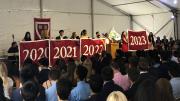University president Lawrence S. Bacow arrived in Cambridge to begin his first year as an undergraduate at the Massachusetts Institute of Technology 50 years ago this fall. Now, as president of Harvard, he began his speech at this year’s Convocation ceremony—a formal welcome for first-year Crimson students—by sharing with the matriculating class of 2023 some of his memories of 1969: the music, the clothes, the technological innovations.
He also recalled the political turmoil of the era. “I still remember riding up to the MIT campus for the very first time and seeing—what else?—a big protest going on at 77 Massachusetts Avenue,” he said, in his most direct acknowledgement of the protest that was going on during his own address. As Bacow began speaking, upperclassmen to the side of the crowd unfurled a large banner reading “Divest Harvard,” and dozens of first-year students within the crowd held up orange pieces of paper that read “DISCLOSE / DIVEST / REINVEST!”
“Now, remember, this was 1969,” Bacow continued. “It was the height of the Vietnam War. The police were present in riot gear. There were a bunch of students with bullhorns, and there was lots of chanting going on. My father picked this exact moment to turn to me and say, ‘If you decide to do that and you get arrested, don’t call.’” But the protestors were not like the ones so seared into Bacow’s memory—as he spoke, they remained silent.
Although Bacow didn’t directly acknowledge the protest during the rest of his speech, many of the points he made felt relevant to their cause. He offered advice about how matriculating students could best spend their four years as undergraduates at Harvard: learning from each other outside the classroom; seeking out and allowing spontaneous moments to unfold; and seeing college not as a steppingstone to the rest of their lives, but as a part of life itself.
But Bacow also connected all this growth and learning to a bigger goal: “The more you learn, the more you see, the more you understand what needs to change,” he said. “Harvard is not perfect. Massachusetts is not perfect. This country is not perfect, and neither is the world in which we live.” No one—“liberal or conservative, Democrat or Republican”—would disagree with that sentiment, he continued. “It’s necessary for all of us to stand up and speak for the causes in which we believe.” Bacow also said that in learning about and improving both themselves and the world, students need to hold onto one of Harvard’s most important traditions: “intellectual maturity”—the willingness to adjust beliefs in the face of new information or a better argument.
At the end of his speech, Bacow returned to his thoughts about his own first year of college, half a century ago. “One morning, I guarantee you, you will wake up to find this moment 50 years in the rearview mirror. My hope for you is that the intervening decades are filled with friendship, love, and a lifetime of purpose,” he told the first-years. “In the meantime, give to this wonderful place at least as much as you expect to get out of it. Fight for it, and for your country, and for your world, because they are yours. Change them for the better, and for yourselves, and for all of us.”
Dean of students Katie O’Dair was the first administrator to speak at the event, held under a tent in the Science Center Plaza under gray skies. “I’ve heard it’s good luck for it to rain during an important ceremony, so I hope that it actually does start raining, since it will be a good indication for your next four years,” she said. (By the convocation’s end, her wish came true.) In her speech, she told students that the beginning of college is one of the few times in their lives when they will receive the gift of “newness,” the “fresh opportunity to learn who you are.” She shared her own experiences as a new administrator at Harvard—not recognizing faces, not knowing with whom to sit when she visited student dining halls—and how the uncertainty eventually turned into a sense of home and belonging.
Before the ceremony ended with a student salutation, the presentation of the banner of the class of 2023, and the recognition of first-year dorms, College dean Rakesh Khurana made his point, as he does every year, about the difference between “transactional” and “transformational” college experiences. He also emphasized the importance of the University’s motto, Veritas, beyond the T-shirts and banners on which it is often emblazoned. “A difficult truth is better than a comfortable falsehood,” he said. He then acknowledged that the land on which he and the first-years were gathered had been the traditional territory of Native Americans. “I want to take a moment to acknowledge this uncomfortable truth as you embark on your Harvard education. Today, our ability to discover the truth seems to be so often hindered by forces outside of ourselves.” But, he continued, some of the “most powerful obstacles” to finding the truth also come from within ourselves: “the temptation to conform,” “the belief that we already know the truth.” Especially in light of the external obstacles to truth in today’s world, he asked students to overcome these impulses.
It’s easy to put the word veritas on a T-shirt, to make it a hashtag, just as it’s easy to come together on occasions like this to celebrate our commitment to seeking the truth. It’s harder to wake up every day and live according to these values,” Khurana said. “But I hope you will embrace this path, rooted in exploration of the unknown and discovery of the truth.…You are on a journey that will shape not only your own lives, but our society.”









